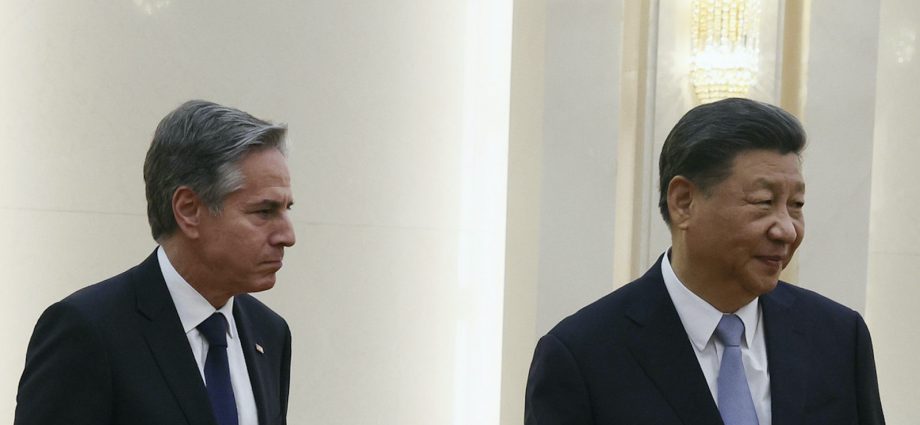US President Joe Biden is sometimes a fountain of odd undiplomatic verbal outbursts, but his dismissive remarks about Chinese leader Xi Jinping and his grip on current events, plus a sudden need to remind everyone that Xi is a dictator, seemed at least untimely if not gratuitous.
During a Tuesday get-together with well-heeled political donors in California, Biden said Xi had been clueless about February’s meandering flight of a giant Chinese spy balloon over US territory. Moreover, the Chinese leader, who has perfected an all-business persona, was “embarrassed” by it all, Biden claimed.
“The reason why Xi Jinping got very upset, in terms of when I shot that balloon down with two boxcars full of spy equipment in it, is he didn’t know it was there,” Biden told 130 rapt guests at a fund-raising event.
“No, I’m serious,” Biden went on, pausing for dramatic effect. “When it got shot down, he was very embarrassed. That’s a great embarrassment for dictators. When they didn’t know what happened.”
It wasn’t exactly clear what was the point of this tale, other than perhaps to impress his audience with inside information. Maybe it was to show that Xi is not the fearsome all-seeing, all-knowing ruler everyone thinks he is. Or that the balloon’s flight was a clumsy one-off event. He had, after all, already called the whole thing “silly.”

But the timing seemed odd given that Biden’s Secretary of State had just returned from a visit to Beijing where he tried to persuade Xi to revive dormant diplomatic communications and generally ease an array of tensions between the two superpowers.
Several US administration officials scrambled to play down the kerfuffle. They said that China was aware of Biden’s off-the-cuff habit and would not be overly perturbed. One surmised that China knows what Biden thinks about communist rule in China, so won’t be particularly upset.
Others nonetheless worried that the suggestion that XI was clueless about the mission of the balloon’s travel was an insult that might block Biden’s desire to ease tensions. Xi’s propagandists tout him as the third of a triumvirate of great post-revolutionary leaders along with Mao Zedong and Deng Xiaoping.
China wasn’t impressed with the helter-skelter explanations. “The relevant remarks from the US side are utterly absurd and irresponsible,” said Foreign Ministry spokesperson Mao Ning on Wednesday. “They’re an open political provocation.”
In any event, the incident detracted from the pros and cons of Blinken’s visit to Beijing. His goal was to stabilize high-level contacts between the US and China.
Nothing spectacularly positive came out of the visit, however. Blinken and Chinese officials agreed to increase flights between the US and China, resume educational and cultural exchanges, and try to find other soft targets of cooperation.
Biden got China to at least “explore” the creation of a joint “working group” on preventing the commerce of fentanyl precursor chemicals from China to Mexico, where the final product is manufactured.
China stopped anti-drug cooperation with US authorities last year. Around 70,000 Americans died from fentanyl overdoses in 2022.
But no agreement was reached on a big-ticket item desired by Biden: renewed military communications. The Americans were especially eager for so-called “risk mitigation” talks after a pair of recent near-collisions in the South China Sea provoked by a Chinese jet and ship maneuvering close to US crafts.
It appears that, on balance, the Biden administration tossed more olive branches toward Beijing than the Chinese threw toward Washington.

Leaks from the State Department said Biden had canceled certain human rights-related sanctions and export controls designed to curb Beijing’s autocratic policies. Meanwhile, the administration has yet to publish the results of an FBI investigation concerning the Chinese spy balloon.
Perhaps Xi was less focused on these gestures than Biden’s frenetic efforts to construct alliances to contain China’s rise. During Biden’s California impromptu lecture on China, he said that Xi is mostly mad about American efforts to contain China via military partners in the Indian Ocean and off China’s Pacific coast.
“He called me and told me not to do that because it was putting him in a bind,” Biden said, without specifying when the conversation took place. “I said, ‘All we’re doing, we’re not trying to surround you, we’re just trying to make sure the international rules with air and sea lanes remain open.’ And we’re not going to yield to that—on that.”
“What he was really upset about was that I insisted that we reunite the so-called Quad,” Biden said.
“Don’t worry about China,” Biden said. “I mean, worry about China, but don’t worry about China,” he added to laughter. “No, but I really mean it. China is real — has real economic difficulties.”

